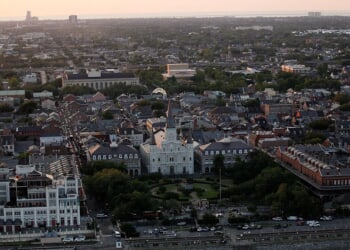The Middle East stands on the edge of a historic diplomatic transformation that could redefine regional dynamics and reshape global alliances. At the center of this potential breakthrough is Saudi Arabia — a dominant economic and religious force in the Arab world — seriously considering joining the Abraham Accords. If President Trump convinces Saudi Arabia to formally normalize relations with Israel, it would mark one of the most consequential diplomatic achievements of the 21st century, comparable in scale to the 1979 Camp David Accords.
His strategy — grounded in strength, pragmatism, and mutual benefit — produced tangible peace, not just rhetoric.
Saudi participation in the Abraham Accords would represent the culmination of a broader realignment that began during Donald Trump’s first term as president. No recent U.S. leader has more significantly shifted the political dynamic of the Middle East. Through unorthodox strategies and bold moves, President Trump laid the foundation for a peace framework that bypassed decades of ineffective negotiations. Now, the groundwork is in place for something even more ambitious — a regional alliance that includes the Arab world’s most influential nation.
The Abraham Accords, signed in 2020, normalized diplomatic and economic relations between Israel and four Arab nations: the United Arab Emirates, Bahrain, Morocco, and Sudan. These agreements disrupted more than seven decades of entrenched hostility. Prior to the accords, only Egypt (1979) and Jordan (1994) had formal peace treaties with Israel. By adding four new countries in under a year, the Trump administration more than doubled the number of Arab nations recognizing Israel — a goal that once seemed politically impossible.
Trade between Israel and the UAE reached over $1.2 billion in the first year alone, according to Israel’s Central Bureau of Statistics. By 2023, that figure had surged to over $3 billion annually. Direct commercial flights between Tel Aviv and Abu Dhabi, as well as Tel Aviv and Manama, became common practice. Over 200,000 Israeli tourists visited the UAE within the first 12 months of normalized relations. Joint ventures sprang up across sectors, including cybersecurity, healthcare, agriculture, and energy. Military cooperation has also increased, particularly in countering the growing threat posed by Iran.
Adding Saudi Arabia to this alliance would be a game changer. As the largest economy in the Middle East, with a GDP exceeding $1 trillion, and as the home to Islam’s two holiest cities — Mecca and Medina — Saudi Arabia holds great religious, economic, and political value. Its official recognition of Israel would not only solidify the Abraham Accords’ legitimacy but likely encourage other Muslim-majority countries such as Indonesia, Pakistan, and even Oman to consider similar moves. Moreover, such a realignment would send a powerful strategic message to Iran, a common adversary of both Israel and Saudi Arabia, about the strengthening coalition of its regional rivals.
Trump is uniquely positioned to broker this deal, having already demonstrated a capacity to succeed where others failed. During his first term, Democrats such as Nancy Pelosi, warned that moving the U.S. embassy to Jerusalem would spark widespread violence and derail any chance at Middle East peace.
Instead, the embassy move was followed by the Abraham Accords. Rather than following the conventional wisdom of gradualism and appeasement, Trump pursued a strategy focused on shared interests — particularly in security, trade, and opposition to Iran. He applied maximum pressure on adversaries while incentivizing cooperation among former enemies.
President Trump’s results stand in contrast to the record of other Nobel Peace Prize recipients. Barack Obama received the award in 2009 just nine months into his presidency — an honor based more on aspirations than achievements, seeing as the Nobel Committee conceded it was awarded for his “vision” rather than concrete results.
Yet, under Obama, the U.S. remained deeply entangled in military conflicts, and his signature foreign policy accomplishment — the Iran nuclear deal — failed to prevent Tehran from continuing its ballistic missile program or funding terrorist proxies like Hezbollah and Hamas. Over $180 billion in sanctions relief flowed into Iran, much of it used to destabilize neighboring countries.
Another controversial recipient was Yasser Arafat, who shared the Nobel Peace Prize in 1994 with Yitzhak Rabin and Shimon Peres. Despite the Oslo Accords, Arafat continued to support violence against Israeli civilians and ultimately failed to deliver sustained peace. The Second Intifada that erupted in 2000 underscored the collapse of those efforts.
The Trump Difference
In contrast, Trump’s Middle East diplomacy produced measurable and lasting results. The Abraham Accords created real, operational partnerships between countries that had previously refused to recognize one another’s right to exist. If Saudi Arabia joins the agreement, Trump’s legacy would be undeniably bolstered, and his case for the Nobel Peace Prize would become even more compelling. His strategy — grounded in strength, pragmatism, and mutual benefit — produced tangible peace, not just rhetoric.
In a time when the world often feels trapped in conflict — from Ukraine to Gaza to the South China Sea — genuine progress toward peace should be acknowledged and celebrated. The Abraham Accords represent such progress, and if Saudi Arabia adds its name to the list, it would mark a defining moment in modern diplomacy.
Trump’s approach — peace through strength, strategic leverage, and a rejection of failed orthodoxies — has already yielded results. If the Nobel Peace Prize is to retain its credibility and purpose, it must reward not merely good intentions but actual peace. With Saudi Arabia potentially on board, that moment may be nearer than ever.
READ MORE from Gregory Lyakhov:
Trump’s Energy Policies Are Transforming the Economy
Trump’s New US–UK Trade Deal Puts America First





![Stephen A. Smith Goes Ballistic on DeMS-13 Senator Van Hollen [WATCH]](https://www.right2024.com/wp-content/uploads/2025/05/Stephen-A-Smith-Goes-Ballistic-on-DeMS-13-Senator-Van-Hollen-350x250.jpg)
![AZ Officer Rescues Fire Captain’s Daughter from Burning Car in Dramatic Video [WATCH]](https://www.right2024.com/wp-content/uploads/2025/05/AZ-Officer-Rescues-Fire-Captains-Daughter-from-Burning-Car-in-350x250.jpg)
![Donald Trump Pardons ‘Century Men’ During West Point Commencement Speech [WATCH]](https://www.right2024.com/wp-content/uploads/2025/05/Donald-Trump-Pardons-‘Century-Men-During-West-Point-Commencement-Speech-350x250.jpg)

![Minnesota Officials Panicking Over Derek Chauvin Pardon Speculation, Potential Unrest [WATCH]](https://www.right2024.com/wp-content/uploads/2025/05/Minnesota-Officials-Panicking-Over-Derek-Chauvin-Pardon-Speculation-Potential-Unrest-350x250.jpg)







